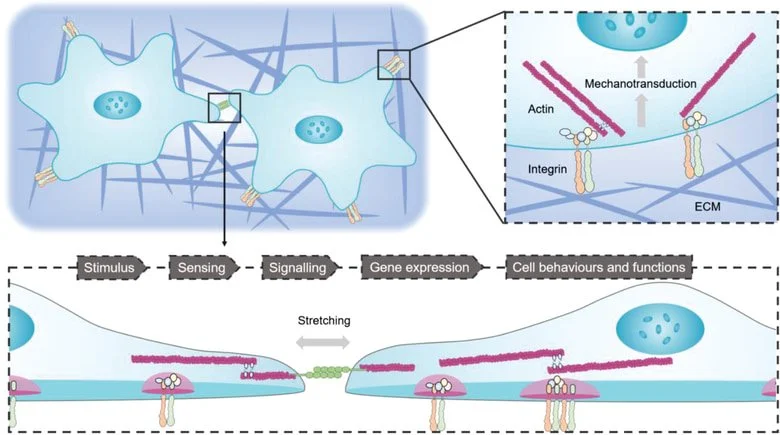Mechanotransduction
In cellular biology, mechanotransduction describes the numerous processes wherein cells transform physical forces into biochemical signals. Stretch receptors on cellular surfaces sense mechanical forces and send the information to activate biochemical signaling pathways. These signals jumpstart biological processes.
Cellular mechanotransduction is at the heart of many sensory responses that allow us to interact with the world. For example, to sense touch, the body converts physical pressure on the skin into electrical signals that are sent to the brain and interpreted as touch. Beyond our senses, mechanotransduction is essential in many biological processes—including muscle contraction, bone growth, and heart development.
Mechanotransduction Is an Important Factor To Be Considered in Pre-Clinical Research and Drug Development
Physical forces cause mechanical deformation of the cells by tension or compression. These tensile and compressive stimuli affect cell function by altering gene expression and cellular phenotype. Failing to account for the mechanical forces on cells during pre-clinical research and drug development is among the numerous reasons why over 90% of promising compounds fail clinical trials.
Mechanical forces on cells cause either physiological or pathological stretch.
Physiological stretch is experienced by cells under natural conditions (e.g., lung cells expand and compress during breathing). The strains are typically less than 10%, and stretching usually happens slowly (1-2 Hz). Physiological cell stretching needs to be considered for applications such as:
Tissue Engineering
Regenerative Medicine
Drug Testing
Mechanobiology
Pathological stretch is a deformation beyond the healthy limit of cells and causes trauma. A pathological stretch of the brain tissue is the root cause of most traumatic brain injuries and concussions. Pathological cell stretching is valuable for research on:
Neurotrauma (traumatic brain injury, spinal cord injury, and concussions)
Neurodegenerative diseases (Alzheimer’s and Parkinson’s)
Drug Development
Mechanotransduction Overview (from ResearchGate)
MEASSuRE: A Powerful Instrument for Investigating Mechanotransduction
BMSEED's Micro Electrode Array Stretching Stimulating und Recording Equipment (MEASSuRE) is an innovative tool advancing how researchers study the effects of mechanical forces on cellular function under different physiological and pathological stretch conditions. MEASSuRE consists of a mechanics module, an electrophysiology, and an imaging. It seamlessly combines three components in one system:
A cell stretching device to apply physiological or pathological mechanical stretch
An electrophysiology module to evaluate cellular health, function, and maturity before and after stretching
A live cell imaging system to visualize cells and cellular processes during injury
BMSEED’s stretchable microelectrode array (sMEA)
Advantages of MEASSuRE
Most cell stretching devices available today are incompatible with electrophysiological measurements, and live-cell imaging during stretching is challenging, limiting observations to post-mechanical stretch. MEASSuRE efficiently integrates electrophysiology and live-cell visualization into a cell stretcher.
A key to MEASSuRE’s unique capabilities is the proprietary stretchable multielectrode array (sMEA). Compared to rigid and flexible microelectrode arrays, sMEA provides a softer and more dynamic cell environment, allow electrophysiological measurements to assess time-dependent cellular health and function before, during, and after stretching, and simulate in vivo conditions in a controlled in vitro environment. At present, BMSEED is the only company that offers stretchable microelectrodes for in vitro research applications.
The goal of MEASSURE is to enable pre-clinical researchers to better predict clinical outcomes. This capability will increase the success rate of clinical trials to develop treatments for the most complex diseases.
Power Your Research With MEASSuRE
MEASSuRE is the only tool enabling researchers to independently and simultaneously apply mechanical stretch, electrophysiology, and imaging. Contact BMSEED to learn more about MEASSuRE.
BMSEED is committed to delivering innovation that improves the precision, efficiency, and affordability of biomedical research. Learn more about us.


